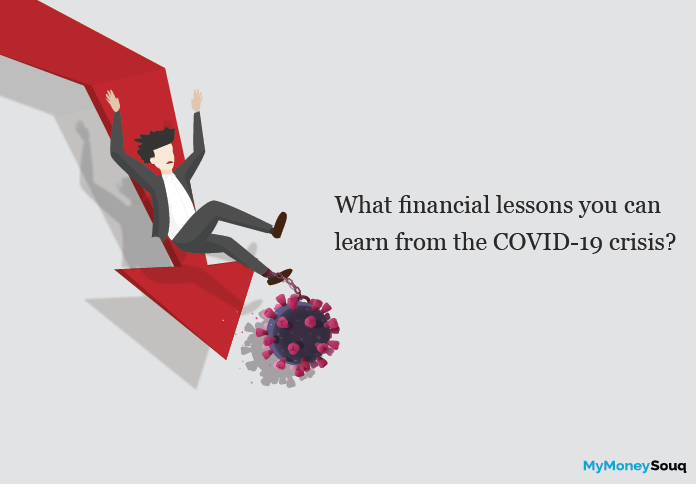We all have read about epidemics and pandemics in history books but never thought that we will ever have to face one. The COVID-19 pandemic has caught the world unawares and created an environment of fear and uncertainty. In these changing times, as most people around the world have confined themselves to the safety of their homes, economies and financial markets are taking a slow ride. As the situation evolves, one can’t help but wonder about the financial impact it will have on our lives.
With social distancing being the best option to contain the spread, businesses around the world are holding up. While governments are doing all they can to reduce the impact of the pandemic on the economic situation of their countries, people tend to get worried about the finances drawing them to learn some financial lessons. We spent some time analyzing the same and have created a list of financial lessons that each one of us must learn from this crisis. Today, we will share those lessons with you.
| Financial lessons you can learn from the COVID-19 crisis |
|---|
| 1. An Emergency Fund is a must |
| 2. Don’t bank on your Investments for emergencies |
| 3. Cultivate the habit of living within a Budget |
| 4. Always create a Diversified Investment Portfolio |
| 5. A secondary source of income is important |
Lesson #1. An Emergency Fund is a must
Try to remember the time before the pandemic. You might have read most investment articles mentioning the importance of having an emergency fund. Every financial expert will plan finances only after accommodating for 3-6 months of living costs as an emergency fund parked in a savings account. This period has been calculated taking various factors into account and designed to help you pay your bills and meet your living costs with ease until the crisis tides over. However, not many people pay attention to this part of the advice.
The general attitude of ‘We Will Manage When The Time Comes’ keeps them away from creating an emergency fund before investing. Also, since this fund does not generate any returns, people find it needless and tend to avoid creating such a fund. However, when an emergency, like the current COVID-19 pandemic, presents itself, the importance of preparing for emergencies is known.
Check here: Importance of Emergency Fund in the UAE
Lesson #2. Don’t bank on your Investments for emergencies
Let’s look at the current situation and imagine an investor who didn’t create an emergency fund and invested all his funds in investment portfolios. During this time, it is quite difficult to redeem investments.
Therefore, when you think about emergencies, you cannot consider investments as a part of your emergency fund. Cash in your savings account is the only definition of an emergency fund that matters.
Lesson #3. Cultivate the habit of living within a Budget
Budgeting is essential for efficient management of personal finances. Many households have benefited from budgeting for decades. However, some people don’t believe in living within a budget or never take the effort to get accustomed to it.
When a situation like a pandemic occurs, usually income slowdown or gets restricted for a while. This means that living costs increase whereas your available resources shrink at a quick pace. During such times, if you are accustomed to living within a budget, then you can manage your finances more efficiently.
Lesson #4. Always create a Diversified Investment Portfolio
Moving from personal finances to investments, the importance of a diversified portfolio is usually felt when an economic slowdown triggered by an event like the COVID-19 pandemic rattles the markets. While hedging offers great benefits during stable market periods, diversification can be your best friend during turbulent times. If your investment portfolio is skewed towards any specific asset class or group of securities and the crash affects it adversely, then your losses can be huge.
A diversified portfolio, on the other hand, consists of securities that are not correlated to each other. Therefore, even if one asset class or group of securities get affected, your portfolio doesn’t nosedive into huge losses. Hence, it is important to always create a diversified investment portfolio to ensure that your overall portfolio risks are low and market crashes (due to any reason) don’t impact you heavily.
Check here: Best ways to save money when you are broke
Lesson #5. A secondary source of income is important
While it might seem like hindsight right now, even in the normal course of life, having a secondary source of income can help you increase your savings, allocate more funds towards investments, and achieve your financial goals sooner. Also, if you have a secondary income source, then during emergencies like the current crisis, you have something to fall back on.
For example, you can look at freelance opportunities and build your portfolio slowly over time so that you can leverage it when needed. The secondary source should ideally be different than your primary source for contingencies.
Summing Up
To face situations like the current pandemic, you must be adequately prepared for emergencies, then you can be in a better position to ride out the storm and recover when everything settles down. We hope that you manage to get through this period unscathed and make better financial decisions. Stay Safe!

